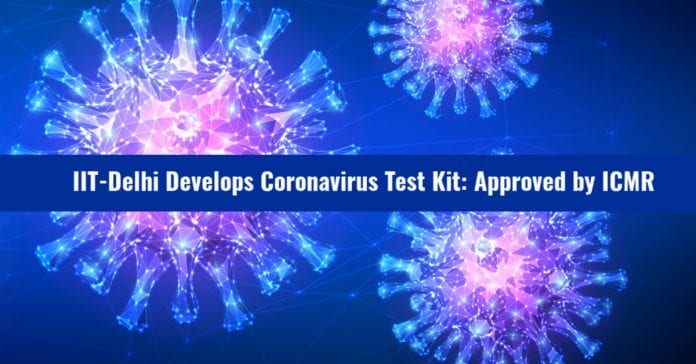IIT-Delhi Develops Coronavirus Test Kit: Approved by ICMR
Coronavirus COVID-19 test kit developed by the IIT-Delhi (Indian Institute of Technology, Delhi) got approved by the ICMR.
V Perumal, Professor at IIT-Delhi, “We began working on it by January end and got it ready within 3 months. We wish to add cost-effective inexpensive diagnostics that could be utilized in large numbers”.
He added, “The COVID-19 test kit is a swab testing kit”. “Testing will certainly be cheaper than all existing kits, and it will be affordable for commercial production”.
The kit for detection assay for COVID-19 developed by researchers at IIT-Delhi’s Kusuma School of Biological Sciences (KSBS) got the approval from ICMR on 23rd April 2020.
A statement from IIT-Delhi stated, “ICMR has verified the assay with 100% sensitivity and specificity, and IIT-Delhi is the very first academic institute to gain ICMR approval for a real-time PCR-based diagnostic assay”.
This COVID-19 test kit is the first ICMR approved probe-free assay. The assay can also be used for specific and economical high throughput testing. This doesn’t require fluorescent probes ad can be easily scaled up. The team is aiming for mass deployment of the kit at affordable rates with ideal industrial partners
as soon as possible.Researchers from IIT-Delhi have also developed a mobile-friendly web-based dashboard called PRACRITI – PRediction, and Assessment of CoRona Infections and Transmission in India for predicting the spread of the virus.
They believe that PRACRITI will be highly useful to efficiently plan for different future scenarios and resource allocation for the healthcare sector, local and central authorities.
A vital parameter of interest on COVID-19 is the R0 (basic reproduction number – number of people to whom the disease spreads from a single infected individual) and its variability across the country. The R0 values of each district and state in India is provided based on the data from WHO, Ministry of Health and Family Welfare, and the National Disaster Management Authority.
Author: Sruthi S






























